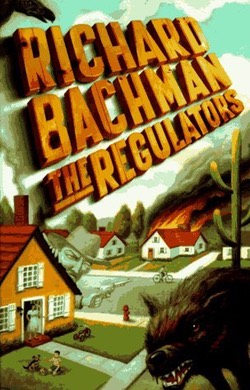The title for The Regulators came to Stephen King first, the gimmick came second, the book came third, and like one of Roger Corman’s AIP productions, where the poster and title were developed long before anyone started writing a script, the results are 1% inspiration, 99% exasperation. This is the book version of Reptilicus or Muscle Beach Party—thin, undemanding entertainment that doesn’t add up to much. Normally, that’s fine, except King had just turned in one of his best-loved books, The Green Mile, and one of his most important books, Desperation.
The Regulators can’t hold a candle to either of these predecessors, and so it winds up feeling even thinner than it already is. King doesn’t help matters by turning the writing over to Richard Bachman, who should have stayed dead.
For a long time, The Regulators was nothing more than a title on a piece of paper stuck to the side of King’s printer, then while he was working on Desperation he had the idea of re-using the same characters from that book in a different story. The final piece of the puzzle clicked into place when he decided to resurrect his Richard Bachman pen name for The Regulators, giving the book a completely different voice than the usual King novels. Thinking this jumble of ideas somehow added up to more than the sum of its parts, the day after King finished writing Desperation he got started on The Regulators.
 Like a Roger Corman movie, things start with a whole lot of potential before rapidly heading downhill. The residents of a quiet neighborhood in Wentworth, Ohio are having a peaceful summer morning when a big red van cruises down their street, rolls down its window, and shotguns the paperboy. Other strange-looking vans appear, some driven by aliens, some driven by cowboys, and they start shooting up the place. Just when you feel like the book might get interesting, all the neighbors hide in a couple of houses, and learn that they’ve been cut off from the world by supernatural means (shades of King’s Under the Dome or “The Mist,” or his incomplete novel, The Cannibals), the kind of mystical hand-waving that tends to decrease, rather than increase, the tension. Adding more supernatural elements to the mix, we learn that the vans are being driven by characters from a popular kid’s show called MotoKops 2200, and an ersatz Western environment complete with horse hitches and cacti starts to superimpose itself over the neighborhood.
Like a Roger Corman movie, things start with a whole lot of potential before rapidly heading downhill. The residents of a quiet neighborhood in Wentworth, Ohio are having a peaceful summer morning when a big red van cruises down their street, rolls down its window, and shotguns the paperboy. Other strange-looking vans appear, some driven by aliens, some driven by cowboys, and they start shooting up the place. Just when you feel like the book might get interesting, all the neighbors hide in a couple of houses, and learn that they’ve been cut off from the world by supernatural means (shades of King’s Under the Dome or “The Mist,” or his incomplete novel, The Cannibals), the kind of mystical hand-waving that tends to decrease, rather than increase, the tension. Adding more supernatural elements to the mix, we learn that the vans are being driven by characters from a popular kid’s show called MotoKops 2200, and an ersatz Western environment complete with horse hitches and cacti starts to superimpose itself over the neighborhood.
Turns out that Tak, the extradimensional entity from Desperation is back and this time he’s possessed an autistic eight-year-old named Seth and is using Seth’s love of MotoKops and a B-Western called The Regulators to warp reality in his bid to escape, yet again, from the China Pit mine. The rest of the book is taken up with stage directions as the large cast of characters hide from bullets, die, run back and forth between houses, blah blah blah. Not since Christine has a Stephen King book felt so hollow. There are surface similarities to “The Mist” (large cast of characters trapped in a single location by dangerous monsters as the world goes insane) but here the book is rapidly overwhelmed by its character choreography.
 The characters are the same characters who appeared in Desperation, and some details—like Tak himself, and an attack by a mountain lion—are lifted right out of the previous novel, but it never amounts to much. King said he wanted to show the characters in different lights, “It would be, I thought, like the members of a repertory company acting in two different plays.” But there is nothing to be learned here. For instance, there are two Collie Entragians. In Desperation he is a giant cop who goes crazy and kills a lot of people. In The Regulators he is a disgraced cop who’s been fired for corruption. The two depictions don’t reflect, echo, illuminate, or play off of each other in any meaningful way. It’s nothing more than a cute trick.
The characters are the same characters who appeared in Desperation, and some details—like Tak himself, and an attack by a mountain lion—are lifted right out of the previous novel, but it never amounts to much. King said he wanted to show the characters in different lights, “It would be, I thought, like the members of a repertory company acting in two different plays.” But there is nothing to be learned here. For instance, there are two Collie Entragians. In Desperation he is a giant cop who goes crazy and kills a lot of people. In The Regulators he is a disgraced cop who’s been fired for corruption. The two depictions don’t reflect, echo, illuminate, or play off of each other in any meaningful way. It’s nothing more than a cute trick.
The biggest problem is that Bachman is in the driver’s seat. King has always been besotted with his Richard Bachman alter ego, using him to write thrillers and science fiction stories and to publish trunk novels that he didn’t want under his own name, and he sees Bachman as a meaner, more hardboiled novelist than himself. In fact, with his current Bill Hodges crime trilogy (Mr. Mercedes, Finders Keepers, End of Watch) it’s as if King is still writing Bachman books. But while King’s Bachman books are fine, Bachman isn’t nearly as good a writer as King thinks he is.
 What King sees as his alter ego’s sadistic, soul deep cynicism, merely comes across as as adolescent flipness on the page. Sentences like “Put aside by Jim Reed, whose solicitude had been superseded by his excitement at the impending mission…” and “The hand went down slowly and jerkily, like a freight elevator,” aren’t hardboiled, they’re overbaked. Bachman’s dialogue has always been square (“He’s your kin!” someone shouts at a particularly tense moment), but here he relies way too much on clumsy exposition delivered as dialogue (“It’s a vampire, isn’t it?” Johnny said. “Only what it draws off is psychic energy instead of blood.”). And some sentences sound like they were started by one writer and finished by another (“At the sound of that voice, Susi forgets all about how nice it is to have Dave Reed touching her breast, and how she’d like to help him forget the death of his brother by taking him upstairs and balling him until his liver explodes.”). The Regulators sports all the writerly elegance of a clumsy dog knocking over a sack of aluminum cans.
What King sees as his alter ego’s sadistic, soul deep cynicism, merely comes across as as adolescent flipness on the page. Sentences like “Put aside by Jim Reed, whose solicitude had been superseded by his excitement at the impending mission…” and “The hand went down slowly and jerkily, like a freight elevator,” aren’t hardboiled, they’re overbaked. Bachman’s dialogue has always been square (“He’s your kin!” someone shouts at a particularly tense moment), but here he relies way too much on clumsy exposition delivered as dialogue (“It’s a vampire, isn’t it?” Johnny said. “Only what it draws off is psychic energy instead of blood.”). And some sentences sound like they were started by one writer and finished by another (“At the sound of that voice, Susi forgets all about how nice it is to have Dave Reed touching her breast, and how she’d like to help him forget the death of his brother by taking him upstairs and balling him until his liver explodes.”). The Regulators sports all the writerly elegance of a clumsy dog knocking over a sack of aluminum cans.
Coupled with lavish descriptions of gore, the bad writing becomes less and less bearable as the book progresses. After a while, it becomes apparent that almost every single on of the characters beyond Seth and his adoptive aunt, Audrey, contribute almost nothing to the story, and that’s when exhaustion sets in. Unfortunately, there’s still another couple of hundred pages left to go, and so you slog on, dragging your eyeballs from line to line, begging for it to be over. By the time the big plot twist reveals itself, and you realize that it involves feeding an autistic eight-year-old laxatives so he poops himself over and over again, you are undone. By that point, you might feel as if you, too, are drowning in an endless cascade of poop. You wouldn’t entirely be wrong.
Grady Hendrix has written for publications ranging from Playboy to World Literature Today and his latest novel is Horrorstör, about a haunted Ikea.











I had a lot of trouble with the whole concept of David and his wife (who was his dead sister in Desperation and I forget her name) not only favoring their son over their daughter, but clearly acting on that favoritism. Like dude no. Dude no. DUDE NO.
Yeah, that sums it up. To elaborate on one of the reasons it’s fails, King is just reusing the characters names and some superficial traits they have in these two books. To work he would have had to have taken the same characters, with all their various strengths and weaknesses and put them in a situation where sometimes what was an asset in Desperation becomes a flaw in The Regulators. Plus the book is so freaking dark it’s impossible to get any joy out of reading it. Normally I like to read books more than once, but I don’t ever see myself wanting to reread this. It would be like wanting to have dental work I didn’t need.
The Regulators originally started life as an original screenplay that King had written that Sam Peckinpah had been attached to (which accounts for his mention in the dedication); King repurposed it for Bachman’s ‘last’ novel.